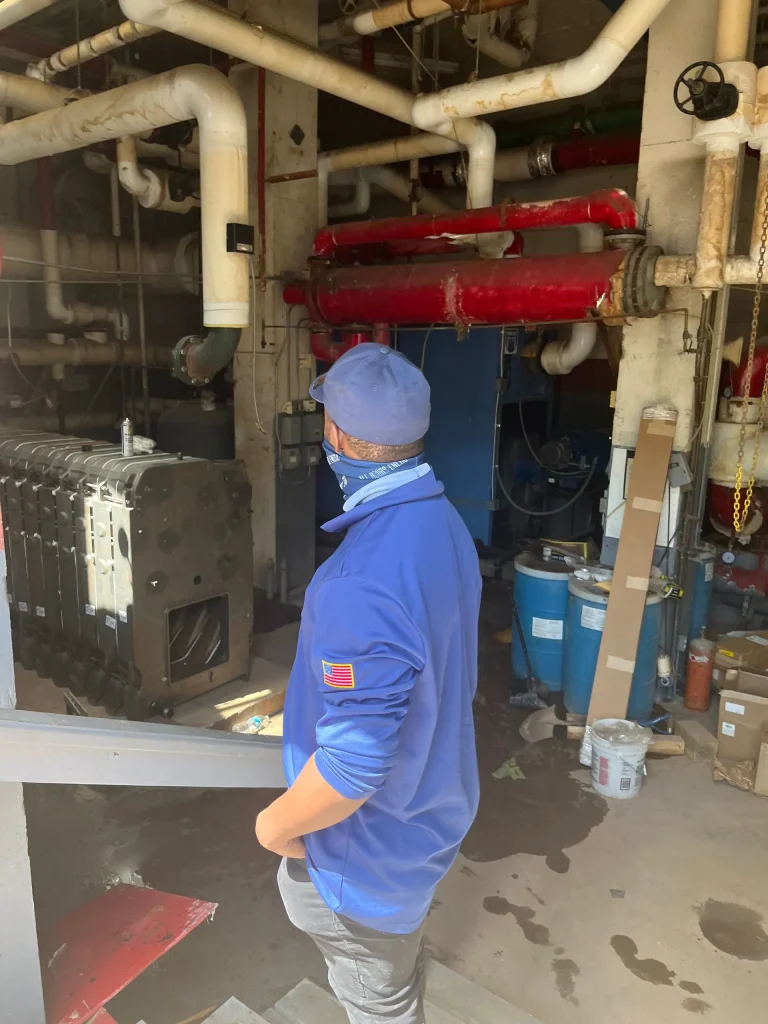If you’re anything like me, the safety and comfort of your home are paramount. Especially when we’re talking about natural gas lines. These lifelines power everything from our kitchens to our cozy winter fireplaces. But, they also require a keen eye and some regular TLC to ensure they remain in tip-top shape.
I’ve put together some trusty tips for gas line maintenance that I’ve picked up over the years. Trust me, a little effort now can save you from any unexpected surprises (and expenses) later!
Understanding Your Natural Gas Lines
Having natural gas lines in your home can feel like a mystery if you’ve never taken the time to understand them. However, a bit of knowledge can go a long way in ensuring safety and proper maintenance. So, let’s unwrap the secrets behind these essential lines!
The Basics of Natural Gas:
- Origins: Natural gas is a fossil fuel formed from plants and tiny sea creatures that decomposed millions of years ago. Today, it’s sourced from underground rock formations and transported via large pipelines.
- Properties: It’s primarily methane, which is odorless. The distinctive smell we associate with a gas leak? That’s mercaptan – an odorant added to make leaks detectable.
How Gas Comes to Your Home:
- Main Lines: These are large pipes, often running under streets, that carry gas from distribution points to local areas.
- Service Lines: These smaller lines branch off from main lines and carry gas directly to your home.
- Meter: Before entering your home, the gas passes through a meter that measures your usage. This is typically where utility workers will check when evaluating your monthly consumption.
Inside Your Home:
- Distribution Pipes: Once inside, gas is distributed to various appliances through a series of pipes. Each appliance has its own dedicated line.
- Shutoff Valve: Every homeowner should be familiar with this. Located before the meter, the shutoff valve allows you to stop the gas supply in emergencies.
Appliances Using Natural Gas:
- Common Appliances: Most of us know that stoves and furnaces might run on gas, but there are several other appliances like water heaters, clothes dryers, outdoor grills, and even some lights.
- Efficiency: One reason many homeowners prefer natural gas is its efficiency. Gas appliances tend to heat up faster and work more efficiently than their electric counterparts.
Safety Features:
- Pressure Regulators: These devices ensure that the gas entering your home does so at a safe pressure. Too high, and it could lead to leaks or damage. Too low, and your appliances won’t function correctly.
- Excess Flow Valves: If there’s a sudden surge in gas flow (like if a line gets damaged), these valves will shut off the gas to prevent a potential disaster.
In essence, your home’s natural gas lines are more than just pipes – they’re a lifeline that powers many of your daily activities. By understanding them better, you can ensure you’re using them safely and efficiently.
Regular Inspection is a Must!
- Check for Visible Damage: Once a year, do a walk-through and check exposed lines for any visible signs of wear, corrosion, or damage. Any questionable areas? It’s better to call in a pro for gas line repair.
- Listen for Leaks: It might sound funny, but your ears can be your best friends here. If you ever hear a hissing or whistling sound near a gas line, it’s essential to act quickly.
- Smell for Gas: Natural gas has a distinct smell – think rotten eggs. If you ever catch a whiff, especially near appliances, it’s time to evacuate and call in professionals.
Avoiding Common Gas Line Pitfalls
Natural gas is an excellent energy source for our homes, but it’s essential to respect and understand its intricacies. Here are a few pitfalls I’ve seen fellow homeowners stumble upon (and how you can avoid them):
Keep the Area Clear:
- Gas Meter: Your gas meter should always be accessible. Keep shrubs, plants, and other obstructions away to ensure utility workers can easily reach it for readings or emergencies.
- Vents & Air Intakes: Ensure vents and air intakes aren’t blocked by debris, snow, or other obstructions. This will ensure proper air circulation and prevent any unwanted gas buildup.
Know Before You Dig:
- Call Before You Dig: Most countries have a service where you can call to get your underground utilities marked. In the U.S., it’s called “Call 811” – a free service that marks the location of underground utilities, including natural gas lines.
- Safe Depths: Even if you’re just planting a new tree or installing a fence post, make sure you’re aware of how deep your natural gas lines run. A small puncture can lead to significant issues.
Educate Your Family:
- Gas Line Basics: Ensure every member, especially the youngsters, know where the gas lines are and the basics of gas safety. It’s always good to have multiple sets of eyes and ears alert for potential issues.
- Emergency Procedures: Everyone should know what to do in case of a suspected gas leak. Simple steps like not turning on lights, avoiding the use of phones inside the house, and evacuating immediately can be lifesavers.
Avoid DIY Repairs:
- Tempting, but Risky: I get it. Sometimes it feels like a tiny issue, and you’re tempted to tighten a connection or replace a segment. However, gas line maintenance and repairs require specialized knowledge. What seems like a fix might end up being a hazard.
Regular Cleaning:
- Dirt and Corrosion: Just like anything else, your gas appliances and the accessible parts of your gas lines can accumulate dirt. Periodic cleaning ensures that dirt doesn’t lead to corrosion or blockages.
- Professional Products: Use cleaning products recommended by professionals. Some harsh chemicals might cause more harm than good to your natural gas lines.
By being aware of these pitfalls and actively working to avoid them, you not only ensure the longevity of your natural gas lines but also the safety of your home and loved ones.
When to Call in the Pros
I’m all for DIY, but there are times when it’s better to call in the experts:
While I’m a huge advocate for self-reliance and understanding your home, there are moments when it’s absolutely crucial to rely on the expertise of professionals, especially when dealing with natural gas lines.
- Annual Check-ups: Just like we need our regular health check-ups, our gas lines crave that professional touch annually. A certified technician can spot issues we might overlook, ensuring your system’s longevity and safety.
- Changing Appliances: Upgrading your stove or installing a new gas-powered dryer? Always have a professional hook up any new appliances to the natural gas lines. It ensures a safe and proper connection, saving potential headaches (and hazards) down the road.
- Home Renovations: Whether you’re tearing down a wall or extending your living space, if your renovation project is anywhere near natural gas lines, it’s best to have a professional ensure that everything remains intact and safe.
- Unusual Pressure Changes: If your gas-powered appliances aren’t functioning correctly (for example, the flames on your stove are too low or too high), this might indicate an issue with your gas pressure. Instead of trying to fiddle with it yourself, let a pro determine the cause and fix.
- Discoloration or Staining: If you notice any unusual discoloration or staining around your gas appliances or on walls and ceilings nearby, it could be a sign of incomplete combustion, which means gas isn’t burning as efficiently as it should. This is a definite call-the-pros scenario.
- After Earthquakes or Natural Disasters: Nature has her moments, and sometimes, they can be a little rough on our homes. If you’re in an area that’s experienced an earthquake, flood, or any other significant natural event, it’s essential to get a professional to inspect your natural gas lines for any damages.
Remember, while it might sometimes seem like an unnecessary expense, calling in professionals for gas line maintenance and gas line repair is an investment in your home’s safety and your peace of mind. There’s no price tag on that!
Conclusion
Natural gas lines, often out of sight and mind, play a remarkably crucial role in our daily lives. From that first cup of morning coffee, brewed to perfection on our gas stoves, to the warm showers powered by our gas water heaters, it’s evident that these lines are an indispensable component of our modern homes.
As homeowners, it’s tempting to focus our attention on the more apparent aspects of our residences, like aesthetics, furniture, or the latest smart home gadget. But, as I’ve delved deeper into the intricacies of natural gas lines, I’ve realized just how profound their influence is on our safety, comfort, and even the value of our homes. We owe it to ourselves and our families to familiarize ourselves with these systems, not just as a responsibility, but as a way to genuinely appreciate the seamless conveniences they offer.
And speaking of ensuring the best for our homes, if you’re located in Chantilly, VA, and are seeking top-notch service providers, 2020 Drain Clean & Plumbing comes highly recommended. With their stellar reputation for handling natural gas line issues, you can reach them at (703) 677-0878. Regular maintenance, awareness of potential pitfalls, and a basic understanding of the system can be transformative. It can mean the difference between a small, easily addressed issue and a significant, potentially dangerous problem.
But more than just the technicalities, understanding our natural gas lines underscores the harmonious blend of nature (in the form of fossil fuels) and human ingenuity, all working silently in the background to power our lives.
Furthermore, in a world increasingly focused on sustainability and green energy, it’s heartening to note that natural gas stands out as one of the cleaner fossil fuels. While it’s not the ultimate solution to our global energy challenges, it certainly represents a step forward, especially when we use it wisely and efficiently.
In wrapping up, I encourage every homeowner to take a moment to think about their natural gas lines. Embrace them not just as utility pipes but as symbols of our modern, interconnected lives. By respecting, understanding, and maintaining these systems, we’re not just ensuring our home’s safety; we’re also acknowledging and appreciating the intricate dance of innovation, nature, and engineering that fuels our daily existence.


